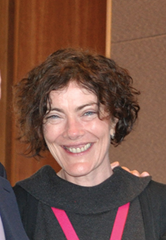Sally Shortall on bringing evidence to policy
 Sally Shortall points out the benefits of academics taking their research findings directly to political leaders.
Sally Shortall points out the benefits of academics taking their research findings directly to political leaders.
Restoration of devolution in Northern Ireland in 2007 and the completion of the first full Assembly mandate prompted a shift in emphasis for the Executive and the Assembly, from stabilising the political institutions to delivering the benefits of devolved government to the people of Northern Ireland. This means delivering effective policies and services which are responsive to Northern Ireland’s needs. The current global economic climate and ongoing cuts in public expenditure across UK make this a more challenging proposition.
These challenges also create a positive environment in which to develop relationships between policy-makers and academics in Northern Ireland. There is an increasing appetite among academics and government to ensure that policy is evidence-informed as far as possible.
There is nothing new about the idea that policy and practice should be informed by the best available evidence. The current emphasis on using evidence-based policies can be traced back to the Blair administrations of 1997 and 2001, when evidence-based policy was defined as an approach that helps people make well-informed decisions about policies, programmes, and projects by putting the best available evidence from research at the heart of policy development and implementation. In Northern Ireland, this shift was reflected in the Northern Ireland Civil Service ‘Guide to Policy Making in Northern Ireland’ as well as the approaches to implementing the statutory duties in Section 75 of the Northern Ireland Act.
The textbook approach to decision-making presumes that there are distinct and logical stages through which the policy-making process progresses. The reality is very different. All policy-making is constrained by available, and often declining, resources. It occurs in a context of values, ideology and political beliefs. Policy priorities that become embedded tend to be the ones that are favourable to the public, stakeholder groups and politicians. There are also many sources of evidence and knowledge. We have a glut of evidence for many policy questions and much of it is inconclusive and contradictory. Academic research is not necessarily designed to inform policy, and evidence changes over time as new research findings overturn our existing understandings.
The policy-making process is extremely complex. It involves a range of different people with different agendas, and research findings can often be contradictory and contested. Evidence is one component in that process. For me, it makes far more sense to speak of evidence-informed rather than evidence-based policy.
While recent attempts to generate evidence-based policies have demonstrated the complexities of such an endeavour, I believe they have also led to better and more effective policies. Building on this tradition, and despite the challenges of using evidence in the policy-making process, as an academic I remain committed to promoting public engagement with local research findings. Working with Eileen Regan from the Research and Information Service of the Northern Ireland Assembly, we have developed an annual Knowledge Exchange Seminar Series.
The series aims to promote evidence-led policy and law-making within Northern Ireland by increasing the profile of local research. The seminars are providing opportunities for discussion and debate, where researchers present their findings about diverse social issues arising under the Northern Ireland Executive’s Programme for Government, such as health, social development, education, and those affecting children, young people and older people. To date, a wide range of individuals have attended the seminars, including MLAs and their staff, Assembly staff, as well as representatives from public and private sector organisations, academics, and voluntary and community groups.
It is my belief that the key in moving forward is to develop open structures and to find a space to develop and foster relationships. Hopefully the Knowledge Exchange Seminar Series is the first step in such a direction.
Dr Sally Shortall is a reader in sociology in Queen’s University School of Sociology, Social Policy and Social Work.





